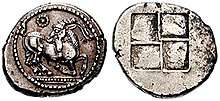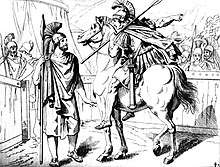Alexander I of Macedon
Alexander I of Macedon (Greek: Ἀλέξανδρος ὁ Μακεδών), known with the title Philhellene (Greek: φιλέλλην, literally "lover of the Greeks", meaning "patriot") was the ruler of the ancient kingdom of Macedon from c. 498 BC until his death in 454 BC. He was succeeded by his eldest son, Alcetas II.
| Alexander I | |
|---|---|
| Vassal of Achaemenid Persia Subordinate King to Achaemenid Persia | |
._Struck_circa_460-450_BC._Young_male_head_right%2C_wearing_petasos.jpg) Coin from the end of the reign of Alexander I, struck circa 460-450 BC. Young male head right, wearing petasos. | |
| King of Macedon | |
| Reign | 498–454 BC |
| Predecessor | Amyntas I |
| Successor | |
| Spouse | unknown |
| Issue | Alcetas II Perdiccas II Philip Menelaus Amyntas Stratonice |
| House | Macedon (Ancient Greece) |
| Dynasty | Argead |
| Father | Amyntas I |
| Mother | Queen Eurydice |
| Religion | Ancient Greek religion |
Biography

Alexander was the son of Amyntas I and Queen Eurydice (Greek: Εὐρυδίκη). He had a sister named Gygaea (Greek: Γυγαίη).[1]
He gave his sister for marriage to the Persian general Bubares, in the late 6th century BC who was in Macedon at the time, in order to stop him from searching for Persian soldiers who had been killed by Alexander's men following his commands.[2][3]
._Struck_circa_480-470_BC.jpg)

Alexander I came to the throne during the era of the kingdom's vassalage at the hand of Achaemenid Persia, dating back to the time of his father, Amyntas I, although Macedon retained a broad scope of autonomy.[4] In 492 BC it was made to a fully subordinate part of the Persian Kingdom by Mardonius' campaign.[5] At that time, Alexander was on the nominal Macedonian throne. Alexander further acted as a representative of the Persian governor Mardonius during peace negotiations after the Persian defeat at the Battle of Salamis in 480 BC. In later events, Herodotus several times mentions Alexander as a man who is on Xerxes' side and follows the assigned tasks.[6]

From the time of Mardonius' conquest of Macedon, Alexander I is referred to as hyparchos by Herodotus, meaning subordinate governor.[7] Despite his cooperation with Persia, Alexander I frequently gave supplies and advice to the Greek city states, and warned them of Mardonius' plans before the Battle of Plataea in 479 BC. For example, Alexander I warned the Greeks in Tempe to leave before the arrival of Xerxes' troops, as well as notified them of an alternate route into Thessaly through upper Macedonia.[8] After their defeat in Plataea, the Persian army under the command of Artabazus tried to retreat all the way back to Asia Minor. Most of the 43,000 survivors were attacked and killed by the forces of Alexander at the estuary of the Strymon river. Alexander eventually regained Macedonian independence after the end of the Persian Wars.
Alexander claimed descent from Argive Greeks and Heracles. After a court of Elean hellanodikai determined his claim to be true, he was permitted to participate in the Olympic Games[9][10][11] possibly in 504 BC,[12] an honour reserved only for Greeks. He modelled his court after Athens and was a patron of the poets Pindar and Bacchylides, both of whom dedicated poems to Alexander.[13] The earliest reference to an Athenian proxenos, who lived during the time of the Persian wars (c. 490 BC), is that of Alexander I.[14] Alexander I was given the title "philhellene" (Greek: "φιλέλλην", fond of the Greeks, lover of the Greeks), a title used for Greek patriots.[15][16]
Family
Alexander had four sons and a daughter:
- Alcetas II, future king of Macedon.
- Perdiccas II, future king of Macedon.
- Philip, father of Amyntas II[17]
- Menelaus.
- Amyntas, whose son Arrhidaeus was the father of Amyntas III.[17] He was thought to be the father of Balacrus, father of Meleager and grandfather of Arsinoe of Macedon[18]
- Stratonice, married by her brother Perdiccas II to Seuthes II of Thrace.[19]
References
- Herodotus, Book 5: Terpsichore, 21
- Joseph Roisman,Ian Worthington. "A Companion to Ancient Macedonia" p136
- Herodotus, Book 5: Terpsichore, 21
- Joseph Roisman,Ian Worthington. "A companion to Ancient Macedonia" John Wiley & Sons, 2011. ISBN 144435163X pp 343
- Joseph Roisman,Ian Worthington. "A companion to Ancient Macedonia" John Wiley & Sons, 2011. ISBN 144435163X pp 135-138
- Joseph Roisman,Ian Worthington. "A Companion to Ancient Macedonia" p138
- Joseph Roisman,Ian Worthington. "A Companion to Ancient Macedonia" p138
- Herodotus (1954). The Histories. Aubrey De Selincourt (trans.). Penguin Group. p. 477. ISBN 9780140449082.
- Malcolm Errington, "A History of Macedonia", University of California Press, 1993, p.4: "Ancient allegations that the Macedonians were non-Greeks all had their origin in Athens at the time of the struggle with Philip II. Then as now, political struggle created the prejudice. The orator Aeschines once even found it necessary, in order to counteract the prejudice vigorously fomented by his opponents, to defend Philip on this issue and describe him at a meeting of the Athenian Popular Assembly as being 'Entirely Greek'. Demosthenes' allegations were lent an appearance of credibility by the fact, apparent to every observer, that the life-style of the Macedonians, being determined by specific geographical and historical conditions, was different from that of a Greek city-state. This alien way of life was, however, common to western Greeks of Epiros, Akarnania and Aitolia, as well as to the Macedonians, and their fundamental Greek nationality was never doubted. Only as a consequence of the political disagreement with Macedonia was the issue raised at all."
- Herodotus 5.22
- Justin-7.2.14
- A History of Macedonia. Volume 2 Review: John Cole
- Thucydides and Pindar: Historical Narrative and the World of Epinikian Poetry Page 180 By Simon Hornblower ISBN 0-19-924919-9
- Conrad Lashley; Paul Lynch; Alison J. Morrison, eds. (2006). Hospitality : a social lens (1st ed.). Amsterdam: Elsevier. p. 25. ISBN 0-08-045093-8.
- φιλέλλην, Henry George Liddell, Robert Scott, A Greek-English Lexicon, on Perseus
- Plato, Republic, 5.470e, Xenophon Agesilaus, 7.4 (in Greek)
- Roisman, Joseph (2010), "Classical Macedonia to Perdiccas III", in Roisman, Joseph; Worthington, Ian (eds.), A Companion to Ancient Macedonia, Blackwell Publishing, pp. 145–165, ISBN 978-1-4051-7936-2
- Satyrus the Peripatetic, FGrH 631 fr 2
- Carney, Elizabeth (2000). Women and Monarchy in Macedonia. University of Oklahoma Press. ISBN 0-8061-3212-4.
External links
| Wikiquote has quotations related to: Alexander I of Macedon |
- Smith, William (1867). "Alexander I". In William Smith (ed.). Dictionary of Greek and Roman Biography and Mythology. 1. Boston: Little, Brown and Company. p. 118.
Alexander I Died: 454 BC | ||
| Royal titles | ||
|---|---|---|
| Preceded by Amyntas I |
King of Macedon 498–454 BC |
Succeeded by Alcetas II |

_Pentathlon.svg.png)